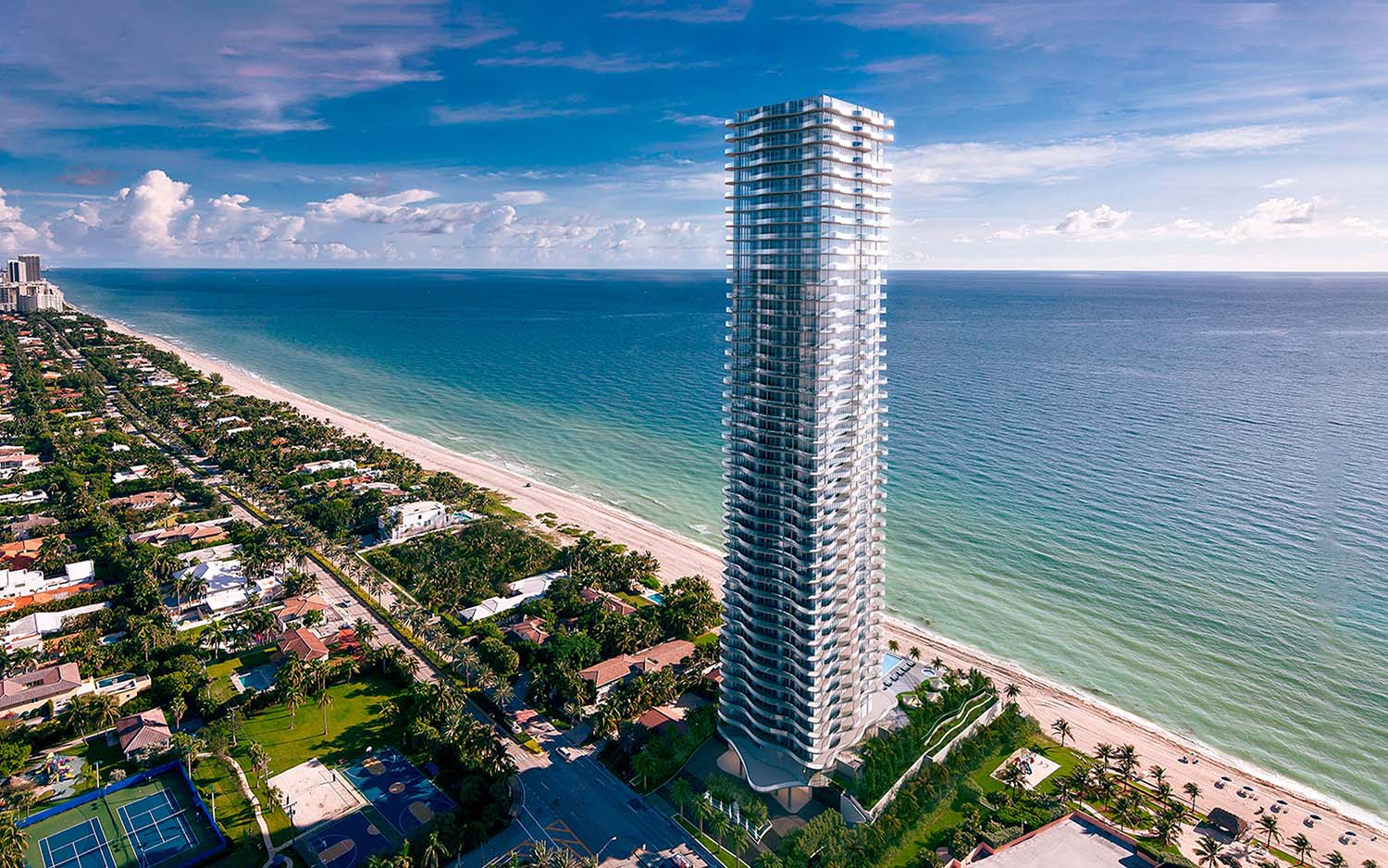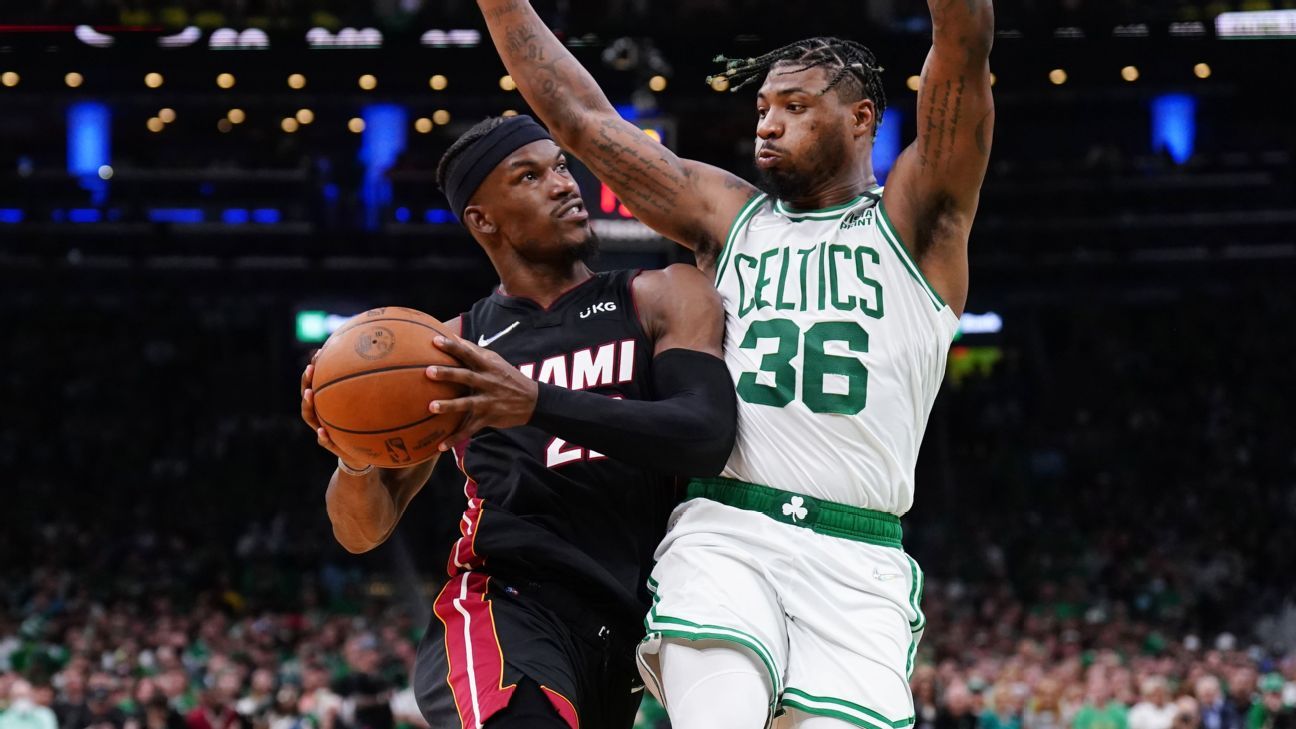Three reasons Miami Heat should remain optimistic ahead of pivotal Game 4 of NBA Finals
MIAMI — The Miami Heat will be entering unfamiliar territory on Friday night.
For the first time this postseason, they’ll walk onto their home court as the team that’s behind in a series.
Despite coming in as a No. 8 seed, Miami ran through the Eastern Conference in a fairly one-sided fashion before losing three in a row against Boston in the conference finals. Before those three losses, the Heat were 11-3 in the postseason, with four wins coming by double digits. And one of the losses was in a game that Jimmy Butler sat out due to an ankle injury.
The only time the Heat have faced elimination in this year’s playoffs was in Game 7 of the conference finals, a game they won by 19 points in Boston.
After a historic night by Nikola Jokić and Jamal Murray in a 109-94 loss in Game 3 of the NBA Finals, the Heat are one loss away from facing elimination again. They’re also one win away from tying the series ahead of a pivotal Game 5 back in Denver.
While much of the basketball world is writing Miami off after Wednesday’s lopsided loss, this team has proven over and over again that it’s capable of coming back stronger after getting knocked to the mat.
Here are three reasons for the Heat to remain optimistic ahead of what will undoubtedly be their most important game to date:
Gabe Vincent had some bad luck with the whistle in Game 3.
After a somewhat quiet start to the game, Miami’s starting point guard had to take a seat earlier than expected in the second quarter after getting called for questionable fouls on back-to-back plays when he was in the wrong place at the wrong time.
Both of those plays could’ve easily gone down as no-calls. Instead, Vincent had to take a seat with 8:51 left in the period. He subbed back in with 2:49 left, and it took all but 20 seconds for him to get called for another foul on a play that could’ve easily gone without a whistle.
Vincent sat for the rest of the half after that call, and his rhythm was off for the rest of the game. He finished with seven points in 32 minutes while shooting 3 of 10 from the field, including 1 of 7 in the second half.
Vincent’s offense has been crucial throughout the playoffs, and his added shotmaking was desperately needed on a night the Heat had trouble finding any success outside of their two leading scorers.
Among Miami’s eclectic supporting cast, Vincent has been the most reliable option as a third scorer throughout the postseason, and he’ll have to get back on track to give his team a shot at tying this series up.
Before his seven-point outing in Game 3, Vincent averaged 17.1 points over his previous eight games, shooting 51.1 percent from the field and 53.2 percent on 3s (5.9 attempts per game).
His confidence has been really high as of late, and his ability to check a number of boxes on offense has made things easier for Butler and Bam Adebayo as primary creators. He’s also been a reliable source of offense when one of those guys goes to the bench.
In Game 3, it felt like a little too much Kyle Lowry on the ball. He’s much more effective when he can muck up the game in other areas. The Vincent-Lowry combination has been a successful pairing for Miami throughout the playoffs. Per Cleaning The Glass, the Heat have a plus-6.2 net rating when Vincent and Lowry share the floor. That number drops to minus-5.9 when Lowry is on and Vincent is not.
I’d expect the Heat to get Vincent involved early to make sure he’s shooting with confidence. If he can turn into that reliable third option again, I’d expect the offense to be much more productive than it was in Game 3.
The Heat should be better on the boards
Outside of the final stat lines from Jokić and Murray, the number that stood out most by the end of Game 3 was Denver’s overwhelming advantage on the boards: 58-33 in total rebounds, 45-23 in defensive rebounds.
Once again, Denver looked like the bigger, stronger team in the paint as Jokić and Aaron Gordon threw around their weight all night. It was the largest rebounding margin in any Finals game since 1972.
It can be demoralizing when another team controls the boards to such a drastic degree while also getting massive performances from its two best players. At certain points in the game, it looked like Denver’s physicality and speed were locked in at such a high level that it started affecting Miami’s spirit on both ends.
“Like I said after the game … those areas — ball in the air, ball on the floor, 50/50 balls — the physicality parts of the game. For the most part, they are winning those,” Heat coach Erik Spoelstra said on Thursday. “Clearly, the rebounding differential was probably the most glaring sign.”
I don’t think the Nuggets can repeat dominating the rebounding battle more than anyone we’ve seen in the Finals in 50 years. So, there’s that. But also, it’s not like the Heat have been an awful rebounding team to this point.
They lost the rebounding battle by two (45-43) in Game 1 and by seven (38-31) in Game 2. During the playoffs, the Heat have a defensive rebounding percentage of 72.7 when Butler and Adebayo are in the game. That would’ve ranked No. 10 in the NBA during the regular season.
First off, Miami has to make a few shots. That would help. Shooting better than 37 percent from the field would give Denver fewer opportunities to grab defensive rebounds. Secondly, they just have to play with more intensity and get the guards involved on the boards rather than leaking out for transition opportunities.
Adebayo did his part, grabbing 17 rebounds, 11 on the defensive end, in Game 3. But he can’t do it alone, especially when he has to use so much energy fending off Jokić. Everyone else has to get involved on the boards and make it easier on him.
Game 4 would also be a nice time for Kevin Love to get more involved on the defensive boards so he can toss out a few of those patented outlet passes to create transition looks. He only had two rebounds in 16 minutes in Game 3.
While the Nuggets present so many issues that are almost impossible to solve because Jokić and Murray are so unstoppable right now, the rebounding woes seem like the easiest fix going into Game 4.
The Heat have to play more desperate and focused, which should be easy considering the historic mountain they’d have to climb if they fall behind 3-1. It’s gut-check time for Miami, and that’s usually when this team is at its best.
Jimmy and Bam in the paint
Butler and Adebayo combined for 45 field goal attempts in Game 3, which is an unusually high number for two players who have taken pride in the unselfish approach they’ve maintained throughout the playoffs.
It’s the most combined field goal attempts they’ve had in any game since their overtime win over Milwaukee in Game 5 of their first-round series.
From the start, it felt like Butler was determined to be more assertive with the ball in his hands. He was seeking out Murray on switches and attacking the space Jokić gave up whenever he played drop coverage in pick-and-roll.
Unfortunately for the Heat, Butler’s aggression didn’t always yield efficient results. By the end of the third quarter, Butler had 26 points on 22 shot attempts, and he only attempted four free throws.
Adebayo played with a similar aggressive mindset, but he wasn’t quite as effective as he was in the first two games. His 7-of-21 performance was the worst he’s ever shot in a playoff game when he’s attempted at least 20 shots.
After looking back at all their shot attempts, it’s easy to see why Butler and Adebayo were so frustrated after the game. They got a ton of good looks, but they just couldn’t get them to fall.
To be fair, Game 3 was the best job Jokić has done as a rim protector in the Finals. It was one of his most effective defensive performances of the postseason this year.
Still, Butler got into the paint more than he has at any point in this series, and he was mostly ineffective. He went 6 of 16 on shots in the paint, including 2 of 8 inside the restricted area.
While it would’ve been a lot better to see him make those bunnies around the rim, it has to be promising to see him improve on the combined seven shots he attempted in the restricted area during the first two games of the series.
The more Butler can get two feet in the paint, the better things will go for the Heat. It appeared in Game 3 that he started to find creases in the defense at a higher rate. He’s also grown more comfortable seeking out Murray in switches. But again, to give Denver credit, Murray did a great job of battling on defense all night while maintaining his aggression on the other end.
“I missed some that I normally make, along with Bam. But we are going to continually get those. Getting two feet in the paint, if you can get a shot up, get it up. If you can’t, get it out to your shooters,” Butler said after Wednesday’s loss. “I think we did a good job with that. Maybe we do have to do a better job of finishing. But those are the same shots that we’re going to get next game, and we are expected to take and make those.”
Adebayo also had a similar struggle on shots around the rim – 5 of 16 on shots in the paint, 3 of 9 in the restricted area – but it’s somewhat understandable for him to have an off-game considering how much of a burden he’s carrying on defense. It really started to show in the second half as a bunch of his shots hit the front of the rim.
Again, it would be better if Butler and Adebayo were making these shots, but it’s a positive sign that they’re getting into the teeth of the defense more than they did through the first two games of the series.
Surely, Spoelstra and the Heat will live with the results if Butler and Adebayo get a combined 17 shots in the restricted area every game the rest of the way.
Related Reading
Murray: Heat must be better in paint in Game 4. How they can do it
(Top Photo of Jimmy Butler: Nathaniel S. Butler / NBAE via Getty Images)



